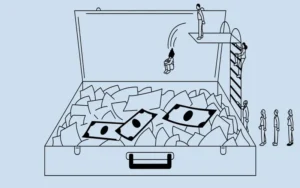What is a landlord?
A landlord is an individual or an entity that owns a property and grants another party the use of that property in return for rental or lease payments. Organizations, enterprises, or other entities may serve as landlords. During the rental period, landlords generally provide essential maintenance and repairs; however, the tenant or leaseholder remains accountable for the sanitation and overall upkeep of the property. In a lease agreement, each party’s particular responsibilities and obligations are typically delineated.
The Role of Landlords
As stated previously, a landlord is an individual who possesses real estate and leases it to others. This entity is referred to as the lessee or tenant. Landlords engage in real estate investment for financial gain. A landlord can potentially benefit from the appreciation of their properties in addition to a steady revenue stream by leasing out investment real estate.
Other than government agencies, individuals, enterprises, and other entities may also serve as landlords. Similarly, the variety of properties that individuals possess may differ. This indicates that their property holdings are not restricted to residential dwellings. Apart from single-family residences, the following may be included in their real estate portfolios:
- Multifamily residential structures, including condominiums, apartment complexes, and single-family homes
- Vacant land and properties
- Lodging accommodations, including cottages and villas
- Commercial properties include mixed-use structures, office buildings, retail malls, and standalone business properties.
Leasing is the customary practice landlords employ when they rent out their properties. A legally enforceable agreement delineating the conditions under which one party consents to rent property from another is known as a lease. In exchange, it ensures that the lessor (the property owner or landlord) is entitled to periodic payments for a specified period and grants the lessee or tenant access to the asset.
Landlord Obligations and Rights
While the rights and responsibilities of landlords differ across states, specific universal laws apply to all jurisdictions.
In addition to rent, property proprietors may also demand prearranged late fees and rent. Additionally, they are permitted to increase the rent under the terms of the tenant-landlord lease. Tenants who fail to make rent payments are subject to eviction by the landlord. Additionally, the eviction procedure differs between states. Most states grant landlords the authority to repossess delinquent rent in addition to paying legal fees.
Owners of real estate must:
- Accountable for maintaining the habitability of their rental properties
- Managing deposits of security
- Assuring a vacant and spotless property before the arrival of a new tenant
Additionally, the landlord must adhere to all applicable local building codes, ensure that all essential services (plumbing, electrical, and heat) are operational, and conduct timely repairs.
Additionally, security deposit administration is an essential responsibility of every landlord. Although landlords may require tenants to provide a security deposit to safeguard against property damage and non-payment of rent, the deposit never vests in the landlord. Regulations and legislation that govern the quantities of security deposits and their maintenance. These regulations differ between states. Tenants who violate these regulations may be subject to legal repercussions.
Varieties of Landlords
Similar to the diversity in the properties that landlords may own, there are also various categories of landlords. Individuals, corporations, and other entities, including government agencies, may constitute them.
Property owners may choose to rent out one or more of their properties for investment purposes, supplement their incomes, or diversify their portfolios. As an illustration, a middle-aged couple might acquire a second residence to lease it out of earnings. By maintaining the rental property during retirement, these individuals can supplement any funds they receive from investments or Social Security.
There are entities, including corporations, that engage in the business of purchasing properties with the explicit intention of leasing them out. As an illustration, a real estate corporation might acquire office structures to lease them to various businesses monthly.
Municipal administrations frequently own housing corporations, particularly those in major metropolitan areas. These organizations own, lease, manage, and maintain housing accommodations for people in need that are affordable or subsidized. The tenant’s income frequently determines the rental payments for these properties.
Positives and Negatives of the Landlord Role
Landlords incur both financial benefits and drawbacks when they acquire rental properties.
In exchange for the rental income the building generates, a proprietor may use leveraged borrowed funds to purchase a rental property. The rental property may be collateral for this debt, liberating additional proprietorial assets.
Positive Aspects of Landlording
- Leverage was utilized to acquire the property.
- Deductible expenses
- Stream of income possibility of appreciation
Negative aspects of being a landlord
- Diverse obligations associated with the upkeep and administration of the property
- Withholding taxes on capital gains
- Tenant-related complications
- Unexpected expenses
- Particular legal obligations
The majority of rental property expenses are tax-deductible. When expenses are deducted without yielding a net profit, rental income is fundamentally exempt from taxation. Leasing property owners increase their ownership percentage of the property and receive access to the appreciation of value as the mortgage on the rental property is repaid.
Nevertheless, if a proprietor divests a property, any capital gains will be subject to taxation unless the funds are transferred to another rental property. This procedure, known as a 1031 exchange, entails particular requirements. The new property must be identified within forty-five days of the transaction, and the complete transfer must occur within one hundred eighty days.
The Restriction of the Landlord’s Rights
There are four primary prohibitions for landlords:
- Landlords are prohibited by law from denying a lease to an individual based on race, color, national origin, sexual orientation, familial status, disability, or gender, per the Fair Housing Act.
- Unless it is an emergency, such as a flood or fire, landlords must provide adequate notice before the tenant’s property is damaged. Although state laws differ, many statutes mandate a minimum of twenty-four hours’ notice.
- Landlords may evict tenants unlawfully for various reasons, but they must invariably do so by the law. Noncompliance with appropriate procedures exposes the proprietor to a hazardous legal predicament.
- Rent increases without notice: To modify a tenant’s rent, landlords must provide sufficient notice, which generally consists of at least 30 days. In addition, rent control laws may prohibit landlords from increasing rentals beyond a certain threshold, even when the lease is up for renewal, depending on the state.
What is the required notice period for a landlord to vacate a tenant’s premises?
In the majority of states, landlords must provide a lessee with thirty days’ notice to terminate a month-to-month lease.
Wimostrame, is the landlord obligated to perform repairs?
Landlord-tenant legislation differs between states. In general, however, a landlord has thirty days to address less severe issues and three to seven days to resolve critical issues (such as no heat or flowing water).
How do I report negligence against a landlord?
Appraising the proprietor for any concerns before lodging a formal complaint is customary. If no response is received or the landlord fails to resolve the issue, you may submit a formal complaint with the following:
- Local health authorities and the Rental Protection Agency
- the Multifamily Housing Complaint Line of the U.S. Department of Housing and Urban Development (HUD) or the local police
To what degree may a landlord increase the rent?
Local regulations govern the extent to which a proprietor may raise rent. State governments determine rent increases in areas without rent controls. As an illustration, the Tenant Protection Act of 2019 increases the rent limit for regions in California lacking a rent control system.
In summary
Landlords are endowed with distinct rights, obligations, and duties. Certain aspects are state-specific, while others are universal and applicable to all states. Each of these should be specified in a lease agreement. This is a crucial legal document specifying the monthly rent and duration the lessee is obligated to pay. In addition, it specifies the obligations and liabilities of tenants and landlords and the repercussions for any violation.
Conclusion
- A landlord is a person or business that owns property and rents it to people in exchange for rent.
- Depending on the type of property and any applicable zoning rules, a landlord can rent to either residential or business renters.
- Every landlord and renter must follow the terms of a lease agreement, a formal document that spells out their rights and duties.
- Being a landlord can bring in quiet rental income, but it can also cost you a lot and pose unique legal and financial risks.
- Landlords can’t treat people differently because of their race or sexual orientation. They also can’t enter the property without permission, remove a renter without following the proper steps, or raise rents without giving notice.














































